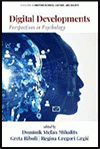
Digital Developments
Perspectives in Psychology
Edited by:
Dominik S. Mihalits, Sigmund Freud University
Greta Riboli, Sigmund Freud University
Regina Gregori Grgič, Sigmund Freud University
A volume in the series: Unifying Science, Culture and Society. Editor(s): Dominik S. Mihalits, Sigmund Freud University. Brady Wagoner, Aalborg University. Jaan Valsiner, Niels Bohr Professor of Cultural Psychology, Aalborg University.
Published 2024
This book provides novel insights and knowledge for both psychology students as well as professionals seeking to integrate technology into their clinical or educational practices. The authors emphasize the importance of considering the behavioural and psychological implications of technology usage, both within treatment settings and in everyday life. The book is organized into five main thematic areas, each consisting of chapters written by a team of researchers who convened at the first European Conference on Digital Psychology held in Milan in 2021. Topics discussed in the book pan a wide range including etherapy, mental health digital applications, the role of videogames in clinical psychology, virtual reality, robotics and artificial intelligence as well as today’s social media. Every subchapter presents the state of the art, potential benefits and risks as well as future directions and implications concerning the usage of mentioned technologies in the field of psychology.
CONTENTS
Preface, Regina Gregori Grgič, and Gabriele Caselli. SECTION I: E-THERAPY. The World of e-Therapy and Mental Health Digital Applications, Enrica Gaetano. Status of Technologies: Digital Tools, Marco Baldetti. SECTION II: VIDEO GAMES. Digital Game Psychology: Roots, Dynamics, and Beyond, Armin Klaps and Birgit Ursula Stetina. Video Gaming for Your Well-Being: What We Know From 20 Years of Research, Claudia Carissoli and Daniela Villani. The Role of Video Games in Clinical Psychology: Benefits, Risks, and Future Directions, Christiane Eichenberg and Jessica Huss. SECTION III: VIRTUAL REALITY. Virtual Reality and Its Applications in Clinical Settings, Between Risks and Benefits, Tommaso Ciulli. Virtual Reality, Between Applications and Software for Use by Mental Health Professionals, Luca Bernardelli. SECTION IV: ROBOTICS AND ARTIFICIAL INTELLIGENCE. Robotics and Artificial Intelligence in Clinical Psychology, Lorenzo Desideri. Robotics and Artificial Intelligence in Developmental Psychology, Lorenzo Desideri. Social Cognition and Human–Robot Interaction, Davide Ghiglino and Agnieszka Wykowska. SECTION V: SOCIAL MEDIA. A Clinical Perspective on Social Media: Opportunities and Risks for Users, Patients, and Psychologists, Federica Sibilla and Tiziana Mancini.
-
Paperback979-8-88730-592-9
Web price: $45.04 (Reg. 52.99)
-
Hardcover979-8-88730-593-6
Web price: $80.74 (Reg. 94.99)
- eBook979-8-88730-594-3

- PSY031000 - PSYCHOLOGY: Social Psychology
- PSY067000 - PSYCHOLOGY: Psychology of Technology
- PSY051000 - PSYCHOLOGY: Cognitive Neuroscience & Neuropsychology
-
 Behavioral Science in the Global Arena
Global Health Trends and Issues
Behavioral Science in the Global Arena
Global Health Trends and Issues
-
 Farewell to Variables
Farewell to Variables
-
 Home in Transition
The Cultural Construction of Heimat
Home in Transition
The Cultural Construction of Heimat
-
 Real Talk
Promoting Social Justice in Education and Psychology Through Difficult Dialogues
Real Talk
Promoting Social Justice in Education and Psychology Through Difficult Dialogues
-
 Ten Years of Idiographic Science
Ten Years of Idiographic Science
-
 The Development of Social Knowledge
Towards a Cultural-individual Dialectic
The Development of Social Knowledge
Towards a Cultural-individual Dialectic
-
 University in the 21st Century
University in the 21st Century

